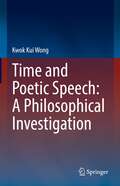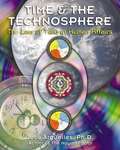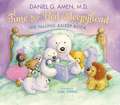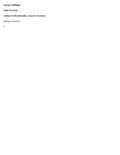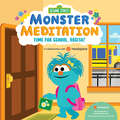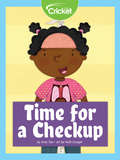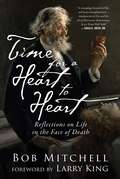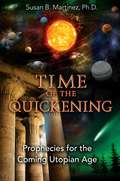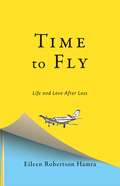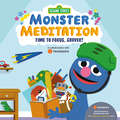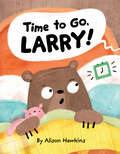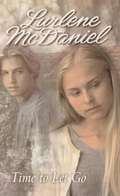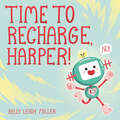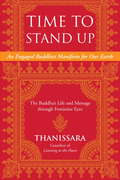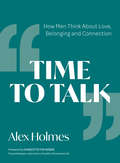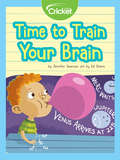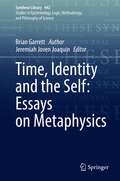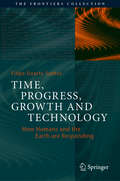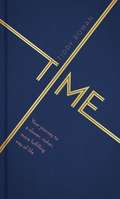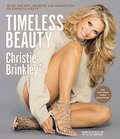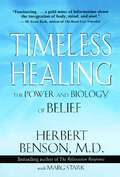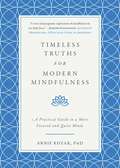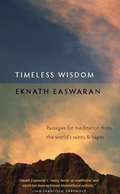- Table View
- List View
Time and Poetic Speech: A Philosophical Investigation
by Kwok Kui WongThis book analyzes the relation between the flow time and poetic speech in drama and rhetoric. It begins with the classical understanding of time as flux, and its problems and paradoxes entailing from Aristotle, Augustine, Kant and Husserl. The reader will see how these problems unfold and find resolutions through dramatic speech and rhetoric which has an essential relation to the flow of time. It covers elements in poetic speech such as affect, rhythm, metaphor, and syntax. It uses examples from classical rhetorical theories by Aristotle, Cicero, Quintilian, dramatic speeches from Shakespeare, as well as other modern dramatic texts by Chekhov, Beckett, Jelinek and Sarah Kane. This book appeals to students and academic researchers working in the philosophical fields of aesthetics and phenomenology as well those working in theater and the performing arts.
Time and the Technosphere: The Law of Time in Human Affairs
by José ArgüellesA groundbreaking study that distinguishes the natural time of the cosmos from artificial mechanistic time. • Reveals September 11 as the signal of the end of artificial time according to the Law of Time. • Long awaited sequel to the author's bestselling book The Mayan Factor. • Explains the Great Calendar Change of 2004 and its enormous potential for the future of humanity. In Time and the Technosphere, José Argüelles presents a groundbreaking study that distinguishes the natural time of the cosmos from the artificial mechanistic time under which we currently live. Argüelles defines the actual nature of time as the frequency of synchronization. Applying this Law of Time to an understanding of the entire system of life on Earth, he shows that in order to not destroy Earth's ability to sustain life, we must change our definition of time and adopt a natural harmonic calendar based on the 13-moon 28-day cycle. Until the creation of the Gregorian calendar and the 60-minute hour, most of humanity lived by the 28-day cycle of natural time. The adoption of artificial time has subjected us to a 12:60 time frequency that governs the entire global industrialized civilization--the technosphere. With the collapse of the Twin Towers on September 11, a fissure was created in this artificial technosphere, opening up the noosphere (Earth's mental envelope). Humanity has a golden opportunity to leave the strife of the past and enter a time of peace by adopting a harmonious natural calendar that will repair the damages caused by the irregular tempo of technospheric time. Our last best chance to adopt this natural time and step into the bright new future promised by the galactic shift of 2012 is the Great Calendar Change of 2004, a new discovery based on the author's mathematical research into the Mayan calendar first begun in his landmark work The Mayan Factor. In Time and the Technosphere, Argüelles reveals the clear distinction between third-dimensional astronomical time and the fourth-dimensional synchronic order of the Law of Time, which holds enormous potential for the future of humanity.
Time for Bed, Sleepyhead: The Falling Asleep Book
by Daniel G. AmenThis book contains specific suggestions that help facilitate sleep.
Time for God
by Jacques PhilippeAre you too busy to pray? What if you could actually gain time and be more productive by praying? Would you pray more? We often forget the real secret to gaining time and being productive is to seek first His kingdom and His righteousness , and all these things shall be yours as well (Mt 6:33). If we make time for God through prayer, He multiplies our time and makes it fruitful and productive in all areas of our life. But have you ever felt unsure about how to pray? For that matter, what exactly is prayer and who is it for? And where, when and how should you pray?
Time for School, Rosita!: Sesame Street Monster Meditation in collaboration with Headspace (Monster Meditation)
by Random HouseRosita learns a simple meditation called Belly Buddy Breathing to help calm her nerves before the first day of school—based on the popular Sesame Street Monster Meditation video on YouTube made in collaboration with the mindfulness app Headspace.Even monsters get nervous the first day of school! Luckily, Rosita learns a fun and easy way to calm her nerves! This terrific board book features Rosita learning a simple meditation that all young boys and girls can easily do whenever they feel nervous. This is Book 4 in a series of 6 books, all inspired by the popular Sesame Street Monster Meditation videos on YouTube, that will help young children learn mindfulness techniques along with their favorite characters. The videos are made in collaboration with Headspace, the mindfulness app. The art style in the books is the same as in the videos--bright and simple, to appeal to the youngest Sesame Street fans. Plus, there's an offer in the book for a free month of the Headspace app!Sesame Workshop, the nonprofit educational organization behind Sesame Street, aims to help kids grow smarter, stronger, and kinder through its many unique domestic and international initiatives. These projects cover a wide array of topics for families around the world.
Time for a Checkup
by Amy TaoPeople visit the doctor at least once a year–even when they’re not sick! Doctors ask questions to check that your mind and body are healthy. Doctors use different tools to find out if you’re healthy like stethoscopes, thermometers and blood pressure cuffs. The nurse will measure your height and weight, too! Find out other ways doctors check if you’re healthy?
Time for a Heart to Heart: Reflections on Life in the Face of Death
by Larry King Bob MitchellTime for a Heart-to-Heart is not your typical memoir, but is rather eclectic in tone—at times philosophical, poetic, poignant, uplifting, confessional, hysterically funny, and nostalgic. But most of all, it is an inspiring story of the triumph of hope and the human spirit in the face of the direst of circumstances and the ultimate challenge of survival. People who have gone through significant heart disease or have undergone organ transplants—as well as their families and friends—will appreciate this book.About a year ago, Bob Mitchell became very sick. He would endure three near-fatal episodes of ventricular tachycardia due to a heart muscle comprised of 54% scar tissue, as well as heart surgeries, two harrowing months of waiting on the transplant list for a new heart on life supporting IV drips (during which time a malignant tumor was detected in his kidney), partial nephrectomy surgery to remove the cancer, another month of waiting, 12-hour heart and kidney transplant surgery, and 100 days on life support in four different hospitals. A novelist at heart, Bob’s ordeal seemed like a memoir screaming to be written.Not simply a narrative of the physical and emotional experience of what it’s like to go through and recover from a transplant, it is at its core both a thought-provoking, introspective monologue, and an intimate dialogue with the reader, concerning life’s fundamental conflicts that the author pondered during his ordeal. These experiences and tribulations gave clarity and perspective to the things Bob had been thinking, teaching, and writing for over five decades: fear and hope, despair and joy, failure and success, pride and humility, thought and feeling, control and surrender, arbitrariness and justice, constriction and freedom, youth and age, life and death.
Time of the Quickening: Prophecies for the Coming Utopian Age
by Susan B. MartinezA guide to the science of prophecy, why so many predictions never come to pass, and the Golden Age ahead • Presents a mathematical means of divining the future, revealed in the Oahspe Bible, using the Egyptian Tables of Destiny, a 12,000-year-old system so exact it can foretell every day of the year • Reveals that we are not headed for Rapture and the Apocalypse but for “the Quickening,” the embryonic stage of a Utopian Age • Examines the cycles of history and explains why many prophecies have not come true Reviewing the cycles of history from biblical times to the present and prophecies of the future from Nostradamus to Edgar Cayce and Jeane Dixon, Susan B. Martinez reveals that our current “time of troubles” is not the beginning of Rapture, the Apocalypse, or Armageddon, but of the embryonic stage of a Utopian Age--the “Quickening” of the human race. Reviving the lost science of prophecy, Martinez explains why so many “great prophecies” have failed and presents the 12,000-year-old Egyptian system of prediction so exact it can foretell every day of the year, a method based not on the planets, astrology, or intuition but on Earth’s magnetic rhythms. Using Earth science, historical research, religious texts, spiritualism, and patterns within the cycles of war and political milestones, she demonstrates that the past is the hidden key to the future and uncovers the prophetic numbers of Earth’s cycles--11, 33, 99, and 363--as set forth in the Egyptian Tables of Destiny, ancient texts brought to light by the 19th-century Oahspe Bible. Explaining how readers can use the Tables of Destiny to make their own predictions of the future, she presents her own forecasts of the risks and costs of technological progress, the destiny of America, the up-and-coming global religion, the truth behind climate change and the cause of earthquakes, and the true life expectancy of planet Earth as well as offering a preview of the Paradigm Shift and Golden Age ahead, a time of global unity and awakening of the soul of the world.
Time to Fly: Life and Love After Loss
by Eileen Robertson HamraReality, as Eileen Robertson Hamra perceived it, instantaneously altered the moment authorities confirmed that the plane her husband was piloting had crashed, and he had not survived.Three days before Christmas 2011 and just two miles from her parents&’ home, Eileen Roberston Hamra&’s husband, Brian, died alone, flying his own airplane. Overnight, Eileen lost the man she loved, and her three young children lost their father. Brian&’s parents lost their son, his younger sister lost her big brother, and hundreds of people working across the globe in the tech and solar energy industries lost their mentor, their leader, their guide. Al Gore sent his condolences. After holding bicoastal celebrations of Brian&’s life, for weeks, months, a year, Eileen and her children wrapped themselves in his clothing, and cocooned. Each night, under the balmy black-blue skies of Southern California, they cried, hugged, and pressed forward in ways they knew Brian would have wanted them to. Through the rollercoaster ride of loss and mourning, they were buoyed by friends, teachers, strangers, angels, and of course, family. Despite the dark sense of having been gutted, in fact because of the shadowy pangs of emptiness she experienced, Eileen learned new ways in which to shine a light and make her way toward feeling whole again. She transformed longing and loneliness into wisdom and wonder. She became more patient, compassionate, balanced, joyful, and loving than she had ever thought possible. Time to Fly is the story of how one woman chose to view the tragedy of her husband&’s death as an opportunity to strengthen the bond with her children, and to wake up to her life&’s purpose. It is one woman&’s high-flying and turbulent journey to taking full possession of her potential by breaking beyond what she thought she would, should, and could do. Eileen Robertson Hamra moved through grief toward healing via a tough and magical spiritual awakening. Making a series of conscious choices and paying attention to a string of &“coincidences&” and otherworldly signs, she eventually met another wonderful man, Mike. They fell in love, got married, and set a well-respected IVF clinic record by giving birth to a miracle child when Eileen was forty-six years old. Time to Fly is a memoir not only for the bereaved and those who support them, but for anyone who believes in the power of finding the silver lining in the darkest of situations and holding on to that sliver of light, in order to turn things around. We do not have complete control over our limited time on this remarkable planet, and so in the time we do have, we must hold one another, build softness alongside resilience, and write our own flight plan
Time to Focus, Grover!: Sesame Street Monster Meditation in collaboration with Headspace (Monster Meditation)
by Random HouseGrover learns simple meditation techniques and plays a fun game to help him learn to focus on one thing at a time in this helpful board book—based on the popular Sesame Street Monster Meditation video on YouTube, made in collaboration with the mindfulness app Headspace.Sometimes everyone needs to slow down and take some cleansing belly breaths--even Grover! Grover is trying to do so many things at once that nothing's getting done! This terrific board book features Grover learning a game to help him focus and complete one task at a time. The game is a fun and simple one that all young children can easily learn and do whenever they feel overwhelmed. Plus there's an offer in the book for a free month of the Headspace app!This is book 3 in a series of six books, all inspired by the popular Sesame Street Monster Meditation videos on YouTube, that will help young girls and boys learn mindfulness techniques along with their favorite characters. The videos are made in collaboration with Headspace, the mindfulness app. The art style in the books is the same as in the videos--bright and simple, to appeal to the youngest Sesame Street fans. Look for Sesame Street: Monster Meditation books 1 and 2:Being Patient with Cookie MonsterGetting Ready for Bed with ElmoSesame Workshop, the nonprofit educational organization behind Sesame Street, aims to help kids grow smarter, stronger, and kinder through its many unique domestic and international initiatives. These projects cover a wide array of topics for families around the world.
Time to Go, Larry!
by Alison HawkinsDebut author-illustrator Alison Hawkins brings a humorous tale about an adorable bear named Larry, who just so happens to be cozy and content exactly where he is. In fact, he never wants to try anything else! That is, until a little loving push helps Larry to find the joy in trying something new.Good morning, Larry! It’s time to wake up!But why would Larry want to get out of bed? His pillows are in the perfect spot, his blankets are just oh so soft, his left foot is tucked in the blanket while his right foot is not… this is obviously the most comfortable and best place to be! But look--just over there the breakfast table is loaded with Larry’s favorites: eggs and bacon and waffles and hot chocolate and one tiny, perfect, tangerine. Perhaps, Larry would change his mind?In this adorable picture book, debut author-illustrator Alison Hawkins presents the relatable and too common tale of a stubborn little bear who is gently, lovingly coaxed into eating breakfast, playing with friends, taking a bath, and going to bed! Parents of little ones will surely relate to this hilarious and adorable bedtime book.
Time to Let Go
by Lurlene McdanielThe doctors assure Erin Bennett and her parents that they can't find a physical cause for her headaches. But the throbbing, violent pain is so intense that Erin knows she needs help. Even landing the lead in the senior musical opposite David Devlin, the good-looking, popular guy everyone else is wild about, doesn't give Erin much pleasure. In fact, she finds David so annoying that her headaches are getting worse.Erin knows that the headaches started just after the death of her younger sister, Amy, one year ago. She though her grieving was over, but somehow the headaches must be connected to Amy. The therapist Erin starts seeing begins to help her deal with her pain, but what is it about David that triggers Erin's violent reaction?From the Paperback edition.
Time to Pee!
by Mo WillemsToilet training has never been such an adventure as when it is introduced by popular cartoonist Mo Willems. With his signature humor, the author gently leads children through each step in the process that will finally bring them to their emancipation from diapers. Featuring a crew of funny mice holding up signs with the text, children will be amused and inspired by this hilarious new picture book.
Time to Recharge, Harper!
by Kelly Leigh MillerEven robots need to recharge in this cheeky picture book about the importance of naptime.Harper the robot does not like to re-charge his battery. His classroom is full of fun things to do, but he can't do any of them when he's all plugged in. So what's a busy bot to do?Author-illustrator Kelly Leigh Miller puts a whimsically futuristic spin to the age-old dilemma convincing nap-resistant kiddos that everyone needs to take time to rest.
Time to Stand Up
by ThanissaraTime to Stand Up retells the story of the historical Buddha, one of the greatest sacred activists of all time, as a practical human being whose teachings of freedom from suffering are more relevant than ever in this time of global peril. Evolving onward from the patriarchal template of spiritual warriors and their quests, former nun Thanissara explores awakening from within a feminine view where the archetypes of lover and nurturer are placed as central and essential for a sustainable world.Vital is an investigation into the pinnacle of Buddhist practice, the realization of the "liberated heart." Thanissara questions the narrative of "transcendence" and invites us into the lived reality of our deepest heart as it guides our journey of healing, reclamation, and redemption. As the book unfolds, the author examines traditional Buddhism--often fraught with gender discrimination--and asks the important question, "Can Buddhist schools, overly attached to hierarchal power structures, and often divorced from the radical and free inquiry exemplified by the Buddha, truly offer the ground for maturing awakening without undertaking a fundamental review of their own shadows?"Chapter by chapter, the book relates Siddhartha Gautama's awakening to the sea-change occurring on Earth in present time as we as a civilization become aware of the ethical bankruptcy of the nuclear and fossil fuel industry and the psychopathic corporate and military abuse of power currently terrorizing our planet. Thanissara relates the Buddha's story to real-life individuals who are living through these transitional times, such as Iraq war veterans, First Nation People, and the Dalai Lama. Time to Stand Up gives examples of the Buddha's activism, such as challenging a racist caste system and violence against animals, stopping war, transforming a serial killer, and laying down a nonhierarchical structure of community governance, actions that would seem radical even today.Thanissara explores ways forward, deepening our understanding of meditation and mindfulness, probing its use to pacify ourselves as the cogs in the corporate world by helping people be more functional in a dysfunctional systems--and shows how these core Buddhist practices can inspire a wake-up call for action for our sick and suffering planet Earth.About the Sacred Activism seriesWhen the joy of compassionate service is combined with the pragmatic drive to transform all existing economic, social, and political institutions, a radical divine force is born: Sacred Activism. The Sacred Activism Series, published by North Atlantic Books, presents leading voices that embody the tenets of Sacred Activism--compassion, service, and sacred consciousness--while addressing the crucial issues of our time and inspiring radical action.
Time to Talk: How Men Think About Love, Belonging and Connection
by Alex R HolmesWe live in a super-connected world, yet men specifically, struggle to connect and share. This is changing... but not quickly enough. Award winning podcaster Alex Holmes sets out to accelerate this shift, debunking lingering myths around masculinity, love and connection by exploring what causes this sense of loneliness.Starting with ‘Real Man Myths' and features designed to encourage us to open up and share, Alex motivates us to move from:Ignoring to Acknowledging.Being Closed to Opening Up.Can't to Can.Avoiding to Embracing.Expecting to Accepting. Sharing his experiences on his podcast and as a young British black man, Time to Talk is a love letter to all the men who have lost their way and to the women that love them.
Time to Train Your Brain
by Jennifer SwansonUsing shorthands, rhythms, flavors, and cartoons, Sam's classmates help him with memory tricks to study for the big test!
Time, Identity and the Self: Essays on Metaphysics (Synthese Library #442)
by Brian GarrettThis volume contains twenty-four essays by the British/Australian analytic metaphysician, Brian Garrett. These essays are followed by four short dialogues that emphasize and summarize some of the main points of the essays and discuss new perspectives that have emerged since their original publication.The volume covers topics on the metaphysics of time, the nature of identity, and the nature and importance of persons and human beings. The chapters constitute the fruits of almost four decades of philosophical research, from Brian’s two award-winning essays, published in Analysis in 1983 and The Philosophical Quarterly in 1992, to his latest ideas about Fatalism and the Grandfather Paradox.This book will be of interest to students and professional philosophers in the field of analytic philosophy.
Time, Progress, Growth and Technology: How Humans and the Earth are Responding (The Frontiers Collection)
by Filipe Duarte SantosThis book addresses the current challenges of sustainable development, including its social, economic and environmental components. The author argues that we need to develop a new concept of time based on inter-generational solidarity, which focuses both on the long- and the short term. The evolution of man's notions of time are analyzed from prehistory to modern times, showing how these concepts shape our worldviews, our ecological paradigms and our equilibrium with our planet. Practical approaches to dealing with the major medium- and long term sustainability challenges of the 21st century are presented and discussed. This is a thought provoking and timely book that addresses the main global socioeconomic and environmental challenges facing the current and future generations, using science-based analysis and perspectives. It presents an historical narrative of the advent of progress, economic growth and technology, and discusses the structural changes needed to co-create sustainable pathways. It provides hope for our future on Earth, mankind’s common home. António Guterres, Secretary-General of the United Nations This is an amazing, almost mind-boggling book. The author takes a look at the true whole, i.e., the development of the human enterprise since its very beginning. This enterprise is evidently a possibility under the boundary conditions of cosmological dynamics and natural evolution, but evidently also a highly improbable one. It is all but a miracle that the Earth system in its present form exists and happens to support a technical civilization. Will this civilization last long, will it transform itself into something even more exceptional, or will it perish in disgrace?Santos dares to address these grandest of all questions, equipped with a unique transdisciplinary wisdom drawing on physics, cybernetics, geology, biology, economics, anthropology, history, and philosophy. And he dares to dive into the deepest abysses of thinking, where categorial monsters like time and progress lurk. Thereby, he takes us on fascinating journey, during which we perceive and grasp things we have never seen and understood before. One of the best essays I have ever read. John Schellnhuber, founding director of the Potsdam Institute for Climate Impact Research (PIK) and former chair of the German Advisory Council on Global Change
Time: Your journey to a slower, richer, more fulfilling way of life
by Tiddy RowanTime is the one thing that is shared by all of humanity, irrespective of wealth, health, race or credo; and one of the things that makes us individual is how we choose to spend it. It is one of the commodities over which we have most control, yet it is the asset we value the least. Isn't it time we took control over how we spend it, while we still can? Time will reward readers of lifestyle quests who seek a better, richer, slower, more fulfilling way of life. For anyone who has ever pondered the paradoxes of time and who is interested in looking at their world from a fresh perspective. Whether you want the encouragement to take time out on a life-scale or simply adjust your life to accommodate a timetable that suits you, this book will have plenty of inspiration, suggestions and tips to help you get the most out of your time.
Timeless Beauty: Over 100 Tips, Secrets, and Shortcuts to Looking Great
by Christie BrinkleyIn her first book in more than 30 years, supermodel Christie Brinkley shares the secrets she's learned on what to eat, how to apply makeup like a pro, and what to wear to look like a knock out. She has the face and body of a 30-year-old and she just turned 60! From tips on which skincare products really make our skin look younger to which foods cut inflammation to a fitness plan with easy exercises to keep us strong and our waistlines lean, Brinkley draws on her years of experience maintaining her supermodel appearance to help readers look and feel their youthful best. She also offers makeup tips that will make any face look younger, fashion advice on necklines, skirt lengths, and more! With never-before-read personal stories, beautiful photographs, hundreds of timesaving tips, plus a good dose of humor, this will be the book that every woman will want to own and share with her friends.
Timeless Healing: The Power and Biology of Belief
by Herbert BensonLearn how the mind shapes the body, and take charge of your health and wellness with the science and power of belief.In this life-changing book, Dr. Herbert Benson draws on his twenty-five years as a physician and researcher to reveal how affirming beliefs, particularly belief in a higher power, make an important contribution to our physical health. We are not simply nourished by meditation and prayer, but are, in essence, "wired for God." Combining the wisdom of modem medicine and of age-old faith. Dr. Benson shows how anyone can, with the aid of a caring physician or healer, use their beliefs and other self-care methods to heal over 60 percent of medical problems. As practical as it is spiritual, Timeless Healing is a blueprint for healing and transforming your life.
Timeless Truths for Modern Mindfulness: A Practical Guide to a More Focused and Quiet Mind
by Arnie KozakMindfulness—focusing on the present moment while accepting your feelings, thoughts, and bodily sensations—is growing in popularity. You can find apps, online courses, and articles on the subject. Businesses like Google are incorporating the practice at work, resulting in lower stress levels, less frustration, fewer sick days, and less burnout. Health centers at universities are getting in on the act too, helping overly stressed students find relief. This basic guide to mindfulness is geared toward the curious, the beginner, and the person looking for real help with the burdens of modern life. Divided into five sections—Appreciating Mindfulness, How to Practice, Mindfulness in Action, Going Deeper, Going Even Deeper—this handy guide tells you everything you need to know to get rid of stress and gain newfound peace: how mindfulness works, how to practice it, and how to apply it in daily life. Along with explanations of mindfulness, each chapter includes a unique guided meditation and a timeless truth that will guide the reader to deal with obstacles to practicing mindfulness, living with wisdom, and how to create unconditional happiness through mindfulness.
Timeless Wisdom
by Eknath EaswaranTimeless Wisdom is the companion volume to Eknath Easwaran's Passage Meditation. Passage Meditation gives Easwaran's instructions in his method of meditation; Timeless Wisdom is his accompanying collection of texts that are suitable for study and meditation. In this selection from the great spiritual traditions, Eknath Easwaran brings the world's timeless wisdom within reach of the modern seeker. These passages include flashes of insight from the Hindu Upanishads, heartfelt prayers of the Christian saints, the passionate songs of the Sufis, and thoughtful teachings from the Jewish, Buddhist, and Taoist traditions. An authority on world mysticism, and outstanding translator of the Indian classics, Easwaran chooses texts that are positive, practical, and meaningful for readers today. This anthology is a compact version of Easwaran's God Makes the Rivers to Flow, with a new preface and some new texts. This is a book to read and reread, each time drawing more from the well of inspiration in its pages.
Timeless: A Century of Iconic Looks
by Louise Young Loulia SheppardBy Louise Young and Loulia Sheppard, 2018 Academy Award nominee for her hair and make-up design on Victoria and Abdul.'If you haven't heard of Louise Young and are interested in period makeup, or any makeup in fact, then we highly recommend you check out her latest book.' - PIXIWOOThe definitive step-by-step guide to recreating the most striking make-up and hair styles of the 20th century.Timeless is a beauty bible for the golden ages of style from renowned film, television and make-up artist Louise Young, along with Academy Award-nominated film industry hairstylist Loulia Sheppard.Step-by-step photography and clear, concise instructions help you to recreate make-up and hair looks from the past 100 years of beauty, from the dark, smouldering eyes of the jazz-age flapper to the red lips and victory rolls of the 1940s, right up to the electric colours of the 1980s and beyond.Accurate, practical and beautiful, this is the ultimate guide to the most classic looks of all time.Between them, Louise and Loulia have provided make-up and hair styling for stars such as Scarlett Johansson, Keira Knightley and Selma Hayek, and on films including Victoria and Abdul, Fantastic Beasts and Where to Find Them, Pride and Prejudice, Florence Foster Jenkins, Anna Karenina and The Duchess, among many others.
